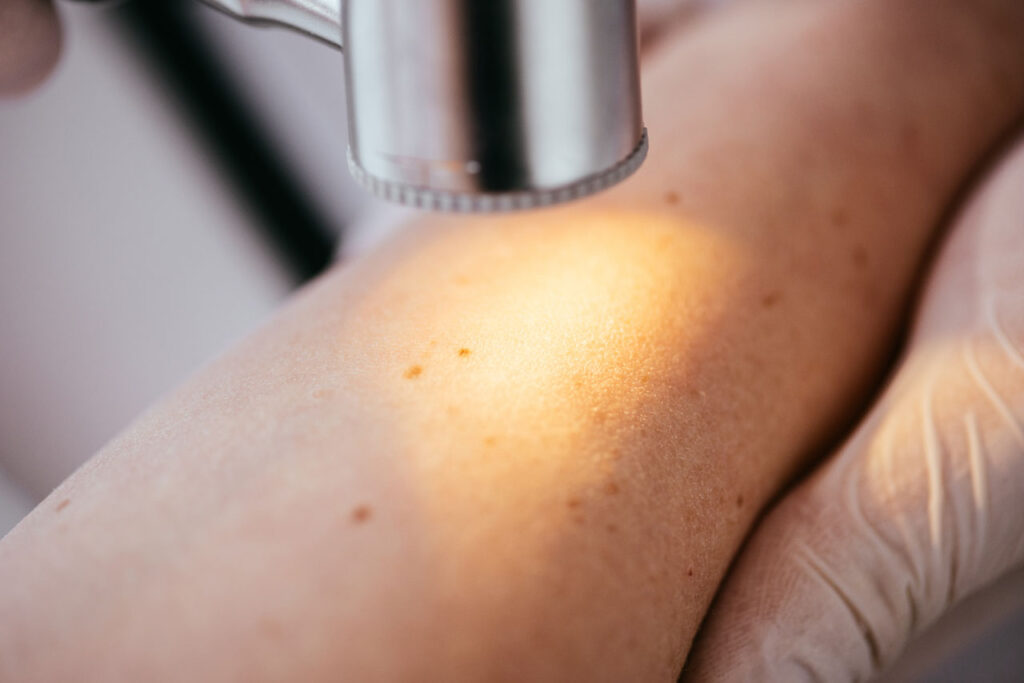
Roughly 1 in 5 Americans will develop skin cancer over the course of their lives. Because this cancer is so common, regular screenings for skin cancer is essential, especially if you have a personal or family history of the disease. Early detection of skin cancer offers better treatment options and a better prognosis.
Board Certified Dermatologist Dr. Solomon Brickman offers full-body skin cancer screening at the Houston Laser Skin Center in Northwest Harris County. His comprehensive screening process includes the examination and biopsy of abnormal lesions and moles.
What are the different types of skin cancer?
There are various types of skin cancers and diseases, including pre-cancers, the more common carcinomas, and much more dangerous melanomas. The four main types of skin cancers are listed below:
Actinic Keratoses (AK)
A precancerous lesion commonly found on sun-exposed areas like the head, neck, hands, and forearms. AKs appear as dry, reddish scaly patches that can potentially progress to squamous cell carcinoma.
Basal Cell Carcinoma (BCC)
The most common type of skin cancer, appearing as a pink area or a flesh-colored/pearl-like bump anywhere on the body. It requires treatment to prevent deeper tissue invasion and disfigurement.
Squamous Cell Carcinoma (SCC)
The second most common skin cancer, often seen on sun-exposed skin as scaly patches, red firm bumps, or non-healing sores. Timely removal is essential to prevent metastasis and skin disfigurement.
Melanoma
A dangerous form of cancer that can suddenly develop as a dark spot or an atypical mole. Early detection using the ABCDEs (Asymmetry, Border, Color, Diameter, and Evolution) and dermatoscope examination is crucial as it accounts for the majority of skin cancer deaths.
Other skin cancers
There are other types of skin cancers that, while rare, still occur. This require much more rigorous screening and investigation:
- Cutaneous T-cell lymphoma (CTCL), which is a rare type of blood cancer affecting the T-cells, which are found in our skin.
- Dermatofibrosarcoma protuberan (DFSP) is a rare type of slow-growing skin cancer that starts in the middle layer of the skin and spreads. It seldom spreads to other parts of the body and has a high survival rate.
- Merkel cell carcinoma (MCC), is a very rare type of skin cancer that has an increase in a diagnosis due to a growing number of people over 65 years of age and the fact that older Americans typically do not protect themselves from the sun. This type of cancer is aggressive and can spread to other areas of the body.
- Sebaceous carcinoma (SC) starts in our sebaceous glands, which are most commonly found around the eyelid. This may appear as a small bump on the eyelid or inside of it; if it is still present after treatment, then this will need to be looked at by a dermatologist.
What are my risk factors?
Both men and women of all ages are at risk for skin cancer, with fairer complexions being more susceptible. Dermatologists, such as Dr. Brickman, recommend that you regularly conduct self-exams to monitor any changes or concerns on the skin. Annual skin cancer screening exams, particularly if you have a family or personal history of skin cancers or work in occupations where have extensive exposure to sunlight, is a critical step towards preventing serious fatal issues later on that, if untreated, can lead to disfigurement or death.
What is the screening process?
During the screening, Dr. Brickman examines the entire body for birthmarks, moles, and abnormal lesions. Biopsies may be recommended for suspicious moles or spots. Various biopsy techniques, including tape biopsy and traditional shave or punch biopsies, are used based on the specific case. Results and treatment options will be discussed after a biopsy.
Dr. Brickman emphasizes the importance of early detection and offers guidance on sun protection. For those requiring a shave or punch biopsy, measures are taken to minimize scarring, and post-biopsy care instructions are provided.
Schedule your skin cancer screening today at our Northwest clinic
Being aware of one’s risk and recognizing the significance of early detection are crucial in effectively managing skin cancer. Regular skin cancer screenings with a Board Certified dermatologist like Dr. Solomon Brickman can help ensure early identification and prompt treatment if needed.
Whether for cosmetic treatments, high-risk individuals, or concerns about abnormal skin growths, individuals can schedule a skin cancer screening exam at the Houston Laser Skin Center in Northwest Harris County.
